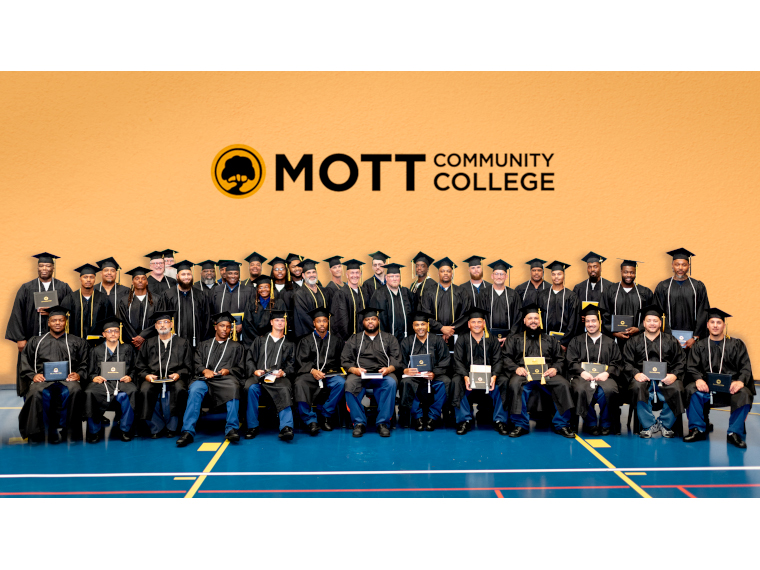Photo by Rachel Urbaniak
(FLINT, Mich., June 25, 2024) – Mott Community College (MCC) celebrated a second commencement ceremony June 18 in the Thumb Correctional Facility in Lapeer. A total of 41 students graduated, during a ceremony that family and friends could attend. It was the fourth Thumb Correctional Facility graduation.
The commencement speaker for the Thumb Correctional Facility was Genesee County Sheriff Christopher Swanson, who said he was thankful to be in a room with so many people doing positive things. He congratulated the graduates for their resilience and encouraged them to be a positive influence on others.
Maurice Lucas was the graduate speaker, who said that education helped him begin his positive journey when he changed his mind-set and made the most of the opportunities offered to him in prison. Lucas earned an A.A. Social Work Concentration, with Honors. He is a member of the National Society of Leadership and Success and the University of Michigan’s Prison Creative Art Project. He has received invitations to join Phi Theta Kappa Honor Society and U-M’s Art Linkage Community.
Lucas is currently an art facilitator, employed as an aide for medically frail prisoners and has created ongoing art programs to assist with prisoner rehabilitation, mental and emotional therapy. He founded a nonprofit organization for at-risk youth, providing them a creative safe space to express themselves through art.
Nine students graduated with highest honors (4.0 GPA), 24 with high honors (3.5-3.999 GPA), and 6 with honors (3.0-3.4999 GPA).
“The commencement ceremony is always a moving experience, because it really drives home for the students that they are empowering themselves for future success through their educational achievements. The sense of pride that the students and their families have for their accomplishments is simply beautiful,” said Mary Cusack, Second Chance Pell Program coordinator.
“This was our largest commencement ceremony to date, with 41 students celebrating the achievement of their associate degree. What is really exciting is that 13 of these graduates will be starting their bachelor degree in business administration with Ferris State University in January as part of our first partnership cohort here at the Thumb,” she added.
MCC is an educational partner in the Second Chance Pell program in Michigan, part of the Second Chance Pell Experimental Sites Initiative (SCP), launched by the U.S. Department of Education (ED) in 2015. The program provides need-based Pell Grants to people in state and federal prisons, expanding access to financial aid for incarcerated adults to participate in postsecondary educational opportunities.
MCC launched its first Second Chance Pell classes in the Winter semester of 2017. The program runs year-round, and takes about six semesters to complete an associate’s degree. Students can earn an Associate of Applied Science in Business or an Associate of Arts with a concentration in Social Work. Mott has conferred nearly 60 associate degrees and certificates of achievement to students at the Thumb since the program’s inception.
The Michigan Department of Corrections currently gives first priority to the Second Chance Pell program to incarcerated people who are within three to eight years of release, to help them earn credentials that will help them get a job or start a career upon release, according to Cusack.
The value of educating returning citizens has high returns. Postsecondary education in prison contributes to successful reentry for people who have been incarcerated and promotes public safety.
Incarcerated people who participate in postsecondary education programs have 48 percent lower odds of returning to prison than those who do not, according to a study published in the Journal of Experimental Criminology by Robert Bozick, Jennifer Steele, Lois Davis, and Susan Turner, in 2018. As incarcerated people achieve higher levels of education, their likelihood of recidivism decreases.
This means that every dollar invested in prison-based education yields four to five dollars in taxpayer savings from reduced incarceration costs, as shown in the 2019 study Investing in Futures, by Oakford, Brumfield, Goldvale, et al.
During the five-year period from 2016 to 2021, 28,119 unique, or “unduplicated,” students have enrolled in postsecondary education through the Second Chance Pell Initiative. In that time, more than 9,000 students have earned either an associate’s degree, a bachelor’s degree, or a certificate or diploma, including more than 1,900 credentials earned in the past year.
“With the expansion of Pell, we can offer those serving a life sentence the opportunity to earn a degree,” Cusack said. “This is a positive move because these individuals can be mentors to other incarcerated people, increasing safety and stability for both the incarcerated population and facility staff,” she added.


